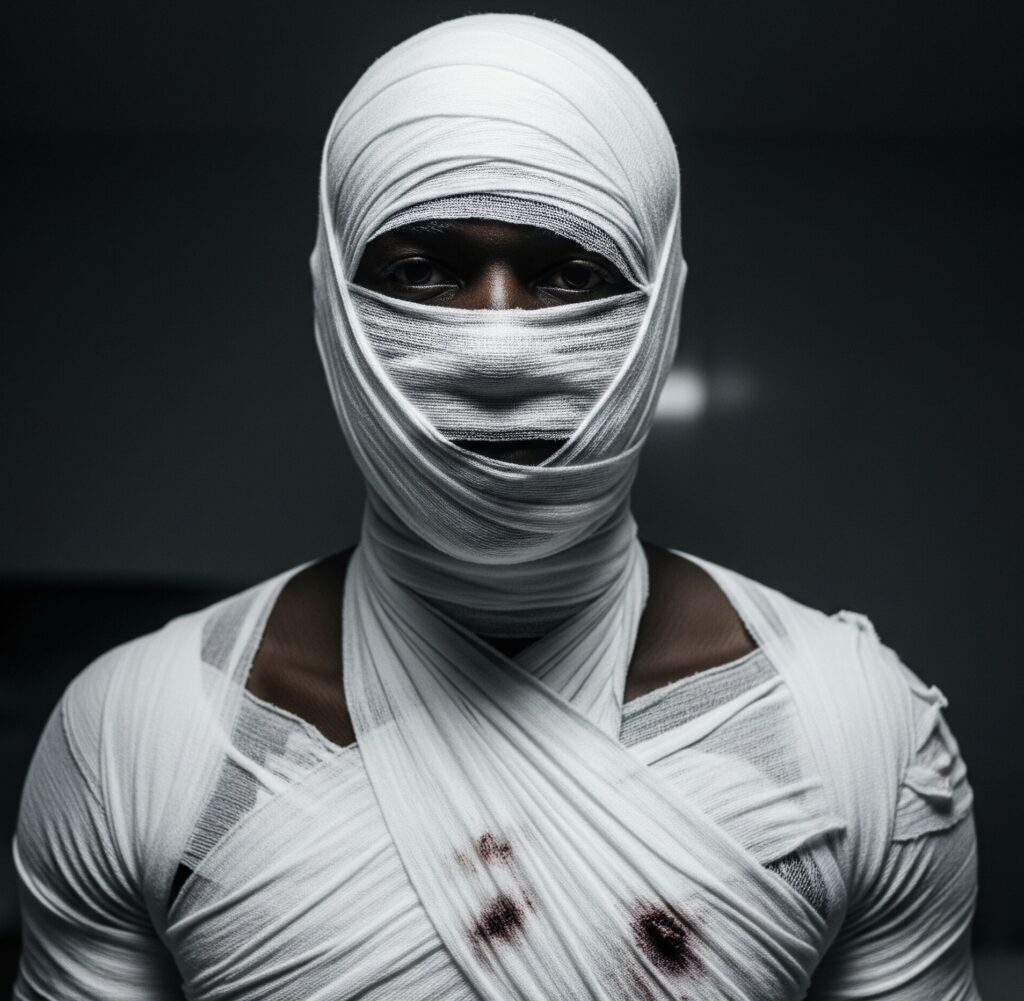Stop Bleeding All Over the Place, Love. It’s Messing Up Your Life.
You can do all the manifestation boards, all the positive affirmations, all the energy work in the world, but if you’re still bleeding on people who didn’t hurt you, you’re building your dream house on quicksand. You’re taking that old pain, that old garbage, and splattering it everywhere, pushing away the very connections and opportunities you crave. And frankly? It’s gotta stop.
This isn’t about being mean or shaming you. Hell no. This is about radical self-accountability because that’s where your power lives. I’ve been there. Lord knows, I’ve bled on people who were nothing but kind to me because I was carrying festering wounds I hadn’t dared to clean out. It took a hot minute, some serious soul-searching (and a few bruised relationships) to figure this shit out. Now? Let’s get you clued in so you can stop the cycle and actually live that new life you’re building.
Why is Healing SO Damn Important?
Think of unhealed emotional wounds like physical ones. If you cut your hand and don’t clean it out, don’t bandage it, what happens? It gets infected, right? It throbs, it aches, and every time something bumps it – even gently – it sends pain shooting through you.
Unhealed emotional trauma, past hurts, betrayals, disappointments – they work the exact same way. They fester beneath the surface. And guess what? They don’t just sit there quietly. They dictate how you see the world, how you react, and how you interact with everyone.
- They become your filter: Your past pain warps your perception. You see potential threats where there are none, assume the worst intentions, and filter everything through the lens of your old wound.
- They steal your energy: Carrying that baggage is heavy, isn’t it? It drains your vital energy, the stuff you need for creating, for loving, for living!
- They keep you stuck: You’re trying to move forward, but the un healed past has anchors in your soul, holding you back, making you repeat old patterns. Learning from these experiences is key to breaking the cycle.
Simply put, you NEED to heal because those wounds will sabotage everything good trying to come into your life – every healthy relationship, every joyful experience, every shot at true abundance. Because you’re walking around with an open wound, and you’re accidentally spraying blood on anyone who gets too close. And trust me, honey, that’s not a good look.
What Happens When You Bleed on Other People? (Spoiler: It Ain’t Pretty)
When you haven’t dealt with your own hurt, you end up projecting that unprocessed pain onto others. Projection is basically dumping your internal crap onto someone else because it feels too uncomfortable to hold it yourself. Your unhealed stuff shows up in your relationships – with family, friends, lovers , even colleagues – often in completely messed-up ways.
Here’s how that looks in real life:
- Misplaced Anger and Ir ritability: Someone does something minor – forgets to text back quickly, makes a gentle suggestion at work, your partner leaves their socks on the floor (again) – and you react with an intensity that is completely disproportionate to the situation. That volcanic reaction? That ain’t about the socks, love. That’s about the time someone majorly disappointed you, or you felt ignored, or you felt unseen, and that old wound is screaming , looking for an outlet.
- Trust Issues (Where They Aren’t Warranted): Because someone in your past betrayed you, lied to you, or abandoned you, you automatically approach new people with suspicion and fear. You question their motives, look for signs they’ll eventually hurt you, and sometimes even create scenarios that test their loyalty – effectively pushing them away before they have a chance to ” hurt” you (which they likely weren’t going to do anyway). You assume your current partner will hurt you like a past one did, even if they’ve given no indication they would.
- Picking Fights or Creating Drama: Unprocessed pain can make you restless, constantly seeking external validation or chaos because the internal landscape feels unbearable. This can manifest as picking arguments, stirring the pot, or needing constant reassurance, which is exhausting for everyone around you.
- Emotional Shutdown or Avoidance: Conversely, past hurt can teach you that getting close or showing vulnerability is dangerous. So, you build walls sky-high, emotionally detach during conflict, and avoid intimacy or deep connection even with people who are safe. This makes genuine connection impossible and leaves you feeling lonely, even when you’re surrounded by people.
- Assuming the Worst Intentions: Because you were hurt, you assume everyone is out to get you, deceive you, or let you down. A simple misunderstanding becomes proof that they “don’t care” or “aren’t there for you,” when really, they just… misunderstood.
When you constantly “bleed” on people like this, you create a toxic environment around you. You erode trust, make communication damn near impossible, and create distance where connection could be. You push away the family who loves you, the friends who support you, the partners who adore you, and potentially the professional connections that could help you thrive. You are self-sabotaging the very relationships that could bring the joy, support, and connection your soul craves on this new path.
How to Fix These Relationships (The Accountable, No-Excuses Way)
Okay , so you’ve realized you’ve been bleeding. You’ve projected your shit onto people who didn’t deserve it. You’ve messed up. Good. Owning that is step one, and honestly, it takes serious guts. So give yourself a tiny nod for that, and then let’s get to work.
Fixing the damage isn’t about beating yourself up endlessly; it’s about acknowledging the impact of your unhealed wounds and making amends where possible, while prioritizing future healthy interactions.
- Radical Ownership (No, Really): This isn’t the time for excuses (“Well, if they hadn’t done X, I wouldn’t have reacted !”). That’s still blaming. This is the time to say, “My unhealed pain caused me to react from a place of wound, not reason, and I lashed out/shut down/created drama because of my stuff . That wasn’t okay, regardless of the situation.” Remember, acknowledging your past isn’t about ignoring genuinely harmful behavior from others, but recognizing how your internal world interacts with external experiences.
- Direct (But Not Overly Emotional) Apologies: Go to the people you’ve bled on. Keep it concise and focused on your behavior and its impact. Something like, “Hey, I’ve been doing some work on myself and realizing that I’ve been taking out some old hurt on you. When I [specific behavior – e.g., snapped at you, accused you, withdrew], that was coming from my stuff, not anything you did. That wasn’t fair to you, and I’m genuinely sorry for the way it affected you.” That’s it. No long sob story, no begging for forgiveness (though obviously, genuine remorse is key). Just clear, direct accountability.
- Show, Don’t Just Tell (Going Forward): An apology is just words if you don’t back it up with changed behavior. The real “fix” comes from showing them, over time, that you are actively working on your healing and committed to not repeating the pattern. Consistency builds trust back.
- Set Realistic Expectations: Not everyone will be ready or willing to instantly welcome you back with open arms. That’s okay. You can’ t control their healing journey or their boundaries. Your focus is on your part, making amends, and changing your future behavior. Give them space if they need it, but keep doing your work.
This process isn’t just for romantic relationships; it’s crucial for family, friendships, and even professional dynamics. Healing these connections means acknowledging where your pain created rifts and actively working to repair them from a place of responsibility and growth.
How Not to Operate From That Space in the Future (Put On Your Big Girl Undies, It’s Work Time!)
Okay, gorgeous. This is where the rubber meets the road. You’ve cleaned up the current mess, but the real game-changer is healing the actual wound so you stop bleeding at all. This is the juicy, challenging, empowering part of stepping into that new life. It takes conscious effort, ongoing awareness, and a firm commitment to yourself.
Here’s how you stop operating from that place of pain and start living from a place of power and light:
- Get Damn Self-Aware: You have to become an expert on you. What triggers you? What situations, words, or behaviors send you spiraling back to that wounded place? Is it feeling ignored? Criticized? Controlled? Abandoned? Start paying attention to your reactions. When you have a strong emotional response that seems out of proportion to the current event, PAUSE. Ask yourself: “What am I really feeling here? Where is this intensity coming from? What past experience does this remind me of?” Journal ing can be your secret weapon here, love. Just get the swirling thoughts and feelings out of your head and onto paper.
- Commit to Inner Work (This Isn’t Woo -Woo Fluff, It’s ESSENTIAL): You can’t slap a bandage on a gaping wound and call it healed. You have to go into the wound, clean it, and allow it to close.
- Process the Past: This might mean therapy (which, by the way, is for strong people who are ready to level UP, not some weakness), especially trauma-informed therapy. It could involve working with a coach , engaging in specific energy healing modalities (like reiki or other forms that help regulate the nervous system), or deeply exploring your past through guided meditations or self-hypnosis techniques that resonate with you. The point is to process the painful emotions and experiences so they lose their power over you.
- Challenge Your Stories: Your unhealed wound tells you lies. It tells you you’re not good enough, not safe, unlovable, bound to be abandoned. These are stories, not facts. Start questioning them. Where did that belief come from? Is it actually true, or is it just your wound talking ?
- Connect with Your Intuition: Your intuition is your inner knowing, your connection to divine wisdom. Your wound operates from fear; your intuition operates from love and truth. Learn to discern the difference. Quiet the noisy pain body and listen to that soft, true voice within you. Spiritual practices like meditation, prayer, or connecting with nature can help anchor you and connect you to something bigger than your pain.
- Master the Pause (Your Superpower): This is the most practical tool. When triggered, learn to insert a pause before reacting. Breathe. Create space between the stimulus and your response. This tiny pause allows your rational mind and your intuition a chance to catch up before your wounded reactivity takes over. Ask again: “Is this truly happening now, or is this an old feeling being triggered?” Practice responding from the present moment, based on the actual situation and the person in front of you, not the ghosts of the past.
- Build Unshakeable Self-Worth: Often, bleeding on others comes from a place of low self-esteem or a fear of not being enough. When you feel secure in yourself, when you know your worth is inherent and not based on external validation or avoiding pain, you have less need to project your insecurities or lash out. Pour into yourself, honey. Do things that make you feel strong, capable, and joyful. Invest in yourself – your growth, your well-being, your peace .
- Set and Maintain Fierce Boundaries: As you heal, you’ll become more aware of what feels good and what triggers you. Setting healthy boundaries is essential for protecting your energy and your healing space. It’s okay to limit contact with people or situations that are consistently re-wounding you. This isn’t about blaming them; it’s about safeguarding your own journey.
- Practice Self-Compassion (Seriously ): This work is HARD. There will be slip-ups. There will be days you regress. Do NOT use that as an excuse to abandon yourself. Beating yourself up is just another form of self-harm originating from the wound. When you mess up, acknowledge it, learn from it, and gently redirect yourself back to the path of healing. Be as kind to yourself as you would be to a beloved friend going through something similar.
Love, hear me on this: your healing journey isn’t a linear, neatly wrapped package. It’s messy, it has twists and turns, and sometimes it feels like you’re slogging through mud. But choosing to do the work, choosing to stop the bleeding, is the single most powerful step you can take toward creating the life you desire. It frees up your energy, clears your vision, and creates the space for healthy, beautiful connections to bloom. It’s about reclaiming your power and building your abundant, joyful, purpose-filled life on a solid foundation of your own healed and radiant energy, love, and light. Now go forth and do the damn work, gorgeous. The world – and your future relationships – are waiting for the whole, healed you.


